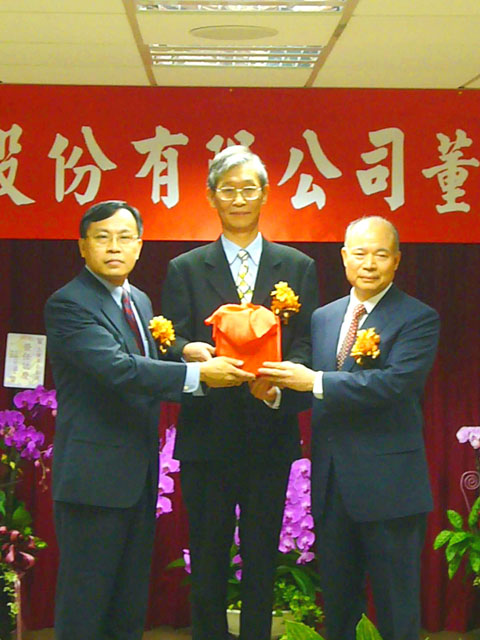Veteran financial official Wang Rong-jou (王榮周) took over the reins at Mega Financial Holding Co (兆豐金控) yesterday, vowing to raise the company’s return on equity (ROE) to more than 10 percent within three years.
The 62-year-old industry veteran voiced confidence that the nation’s third-largest financial services company by market value could realize the goal, despite the fact its ROE had stood at 4.99 percent for the first six months of this year.
Wang also said that under his leadership the company would strive to raise its return on assets to 1 percent, from the current 0.53 percent, in line with goals set by newly installed Financial Supervisory Commission Chairman Gordon Chen (陳樹).

PHOTO: LEE CHING-HUI, TAIPEI TIMES
With assets totaling NT$2 trillion (US$65.8 billion), Mega Financial posted a pre-tax profit of NT$5.8 billion in the first half of this year, a decline of 19 percent from the same period last year.
Former Mega Financial chairman Joseph Lyu (呂桔誠) said that profits would have hit NT$10.2 billion — a 40 percent increase from a year earlier — if the company had not lost NT$4 billion in investments linked to the US subprime mortgage crisis.
Wang, who voiced pride in his coordination and communication skills, said he believed Mega Financial could expand its business at home and abroad.
“I helped streamline Yuanta Commercial Bank [元大銀行] without causing any stir,” Wang said. “The reform successfully boosted the bank’s efficiency, although some people lost their jobs.”
Before being appointed to the helm of Mega Financial, in which the government has a 23 percent stake, Wang worked as Yuanta Bank president, vice minister of finance, investigation bureau chief and head of the national treasury agency, among other posts.
Wang said that Mega Financial was eyeing the capital market in China and the rest of the world, and that the company was in an advantageous position to expand its global footprint.
Once the government relaxes its rules, Mega Financial will seek to set up subsidiaries or branches in China,” Wang said. “I believe it is in the company’s interest to do so.”
The company has 179 branches and offices in Taiwan and 28 outlets overseas.
Wang was less clear about potential acquisition plans, saying he needed more time to evaluate whether to merge with other financial firms such as Taiwan Business Bank (台灣企銀), in which Mega Financial has a 14 percent stake.

STEEP DECLINE: Yesterday’s drop was the third-steepest in its history, the steepest being Monday’s drop in the wake of the tariff announcement on Wednesday last week Taiwanese stocks continued their heavy sell-off yesterday, as concerns over US tariffs and unwinding of leveraged bets weighed on the market. The benchmark TAIEX plunged 1,068.19 points, or 5.79 percent, to 17,391.76, notching the biggest drop among Asian peers as it hit a 15-month low. The decline came even after the government on late Tuesday authorized the NT$500 billion (US$15.2 billion) National Stabilization Fund (國安基金) to step in to buoy the market amid investors’ worries over tariffs imposed by US President Donald Trump. Yesterday’s decline was the third-steepest in its history, trailing only the declines of 2,065.87 points on Monday and

TAKING STOCK: A Taiwanese cookware firm in Vietnam urged customers to assess inventory or place orders early so shipments can reach the US while tariffs are paused Taiwanese businesses in Vietnam are exploring alternatives after the White House imposed a 46 percent import duty on Vietnamese goods, following US President Donald Trump’s announcement of “reciprocal” tariffs on the US’ trading partners. Lo Shih-liang (羅世良), chairman of Brico Industry Co (裕茂工業), a Taiwanese company that manufactures cast iron cookware and stove components in Vietnam, said that more than 40 percent of his business was tied to the US market, describing the constant US policy shifts as an emotional roller coaster. “I work during the day and stay up all night watching the news. I’ve been following US news until 3am

Six years ago, LVMH’s billionaire CEO Bernard Arnault and US President Donald Trump cut the blue ribbon on a factory in rural Texas that would make designer handbags for Louis Vuitton, one of the world’s best-known luxury brands. However, since the high-profile opening, the factory has faced a host of problems limiting production, 11 former Louis Vuitton employees said. The site has consistently ranked among the worst-performing for Louis Vuitton globally, “significantly” underperforming other facilities, said three former Louis Vuitton workers and a senior industry source, who cited internal rankings shared with staff. The plant’s problems — which have not

TARIFF CONCERNS: The chipmaker cited global uncertainty from US tariffs and a weakening economic outlook, but said its Singapore expansion remains on track Vanguard International Semiconductor Corp (世界先進), a foundry service provider specializing in producing power management and display driver chips, yesterday withdrew its full-year revenue projection of moderate growth for this year, as escalating US tariff tensions raised uncertainty and concern about a potential economic recession. The Hsinchu-based chipmaker in February said revenues this year would grow mildly from last year based on improving supply chain inventory levels and market demand. At the time, it also anticipated gradual quarter revenue growth. However, the US’ sweeping tariff policy has upended the industry’s supply chains and weakened economic prospects for the world economy, it said. “Now